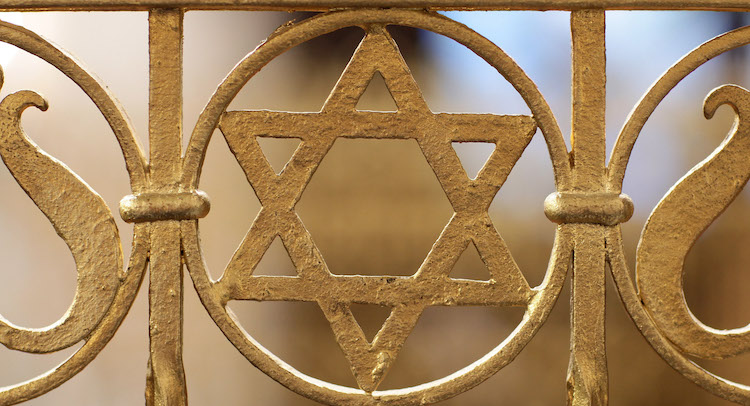The tectonic plates beneath American Jewry are shifting again.
In one of the most symbolically significant developments in organized U.S. Jewish life since Oct. 7, the largest Reconstructionist synagogue has moved to cut ties with Reconstructing Judaism, the denomination’s national umbrella organization.
Kehillat Israel, located in Pacific Palisades, Calif., wrote to Reconstructing Judaism to advise them that the movement’s growing anti-Zionism, and RJ’s enabling of that growth, is the primary reason behind the decision to disaffiliate:
“Notwithstanding the Movement’s avowed affirmation of Israel’s right to exist, its recent actions say otherwise. There can be many opinions about Israeli politics, but Israel’s legitimacy is inalienable, and that is a platform on which Kehillat Israel will stand. The world needs to see that the Jewish people stand united in support of the people of Israel.”
Reconstructionism emerged from the teachings of Rabbi Mordecai Kaplan, who was ordained Orthodox but believed in Judaism’s modernizing and evolving tendencies. It’s a progressive denomination and the only prominent one whose roots do not extend outside the United States. Those factors make it a natural magnet for more activist-minded liberal Jews and thus also those among whom anti-Zionism is most likely to be tolerated. Now, however, anti-Zionism has become normalized and welcomed.
The letter, obtained by JTA, states that the movement’s rabbinical college “embraces students who are openly anti-Zionist and educates them for the Rabbinate, something that is utterly at odds with other Jewish denominations.”
The letter is a fine step all on its own. But it can bring further benefit to the Jewish world if its warnings are heeded. The JTA story references an open letter printed in the Forward last year that is worth revisiting, written by two Reconstructionist rabbinical students who left the college over this very issue.
“Our time at RRC was marked with sorrow and shock, as we experienced an increasingly vociferous anti-Zionism among the student body, the steady erosion of civil discourse and the seminary’s inability to transmit the Jewish narrative to those it will ordain as future spiritual leaders of the Jewish people,” wrote Talia Werber and Steven Goldstein.
Of the graduating class of rabbis last year, they wrote, half were anti-Zionist or active in the anti-Israel protest movement. Out of the college’s 60 total students at the time, only eight joined its pro-Israel group.
Crucially, Werber and Goldstein wrote, “Because of RRC’s rabbinical program, protests led by Jewish Voice for Peace and other anti-Israel organizations will count increasing numbers of rabbis among their ranks, training the next generations to oppose Israel and the safety of Israelis — our own people.”
Whatever its American politics, a Jewish rabbinical institution training Jewish clergy to oppose Jewish peoplehood is a blatant attempt at ethnic self-destruction.
And that brings us to the larger forces at work here. Attacking the legitimacy of the very concept of Am Yisrael has gained purchase in American liberal Jewish circles because for the first time in modern Jewish history, Jewish nationhood has been designated a right-wing, conservative value.
The country saw a glimpse of this after President Trump announced an executive order to fight campus anti-Semitism during his first term, in 2019. Under Title VI of the Civil Rights Act, it is a violation to discriminate on the basis of race or national origin. Building on the work of federal agencies in the George W. Bush and Barack Obama administrations, Trump instructed that Title VI be applied to protect Jews on campus. This was uncontroversial among those who had been following the policy development for a decade and a half, but a fair number of left-wing commentators and activists—a surprising number of them Jews—objected vociferously to the concept of Jewish peoplehood being integrated into U.S. law.
It was a glaring neon sign that something was amiss in part of the American Jewish community’s understanding of its own heritage. More broadly, the left seemed to settle on the idea that this was Jewish nationalism as a right-wing political concept and was therefore to be discarded from modern Jewish identity.
Past Jewish intellectuals would have been shocked by such a mistaken assumption. Simon Dubnow, the great Russian Jewish historian who died in 1941, rejected his parents’ Orthodox lifestyle as so much superstition, but he became a prominent advocate of Jewish autonomism. Ahad Ha’am, among the most famous Jewish intellectuals of his era, is universally regarded as having founded “cultural Zionism.” Ha’am’s key insight was that the Jews must first understand themselves as a nation while in diaspora; only then could they responsibly pursue statehood.
It’s true that Vladimir Jabotinsky, the founder of Revisionist Zionism, is his era’s foremost authority on Jewish (or any other) nationalism, and that his political heirs today are on the Israeli right. But Jewish peoplehood was not then, nor ever, a right-wing concept—neither politically nor religiously. (There are ultra-Orthodox anti-Zionists still today.) American Jews must educate themselves on this heritage and embrace it just as their leaders all across the political spectrum always have. Kehillat Israel’s letter is a well-timed reminder of this important facet of Jewish identity.


















